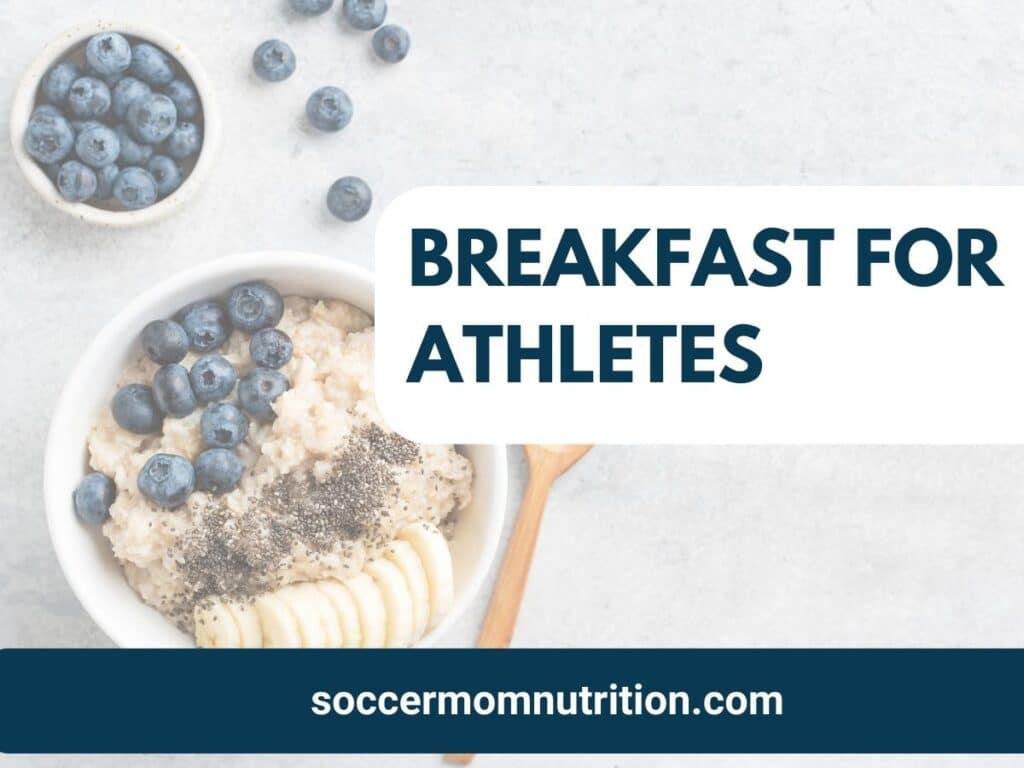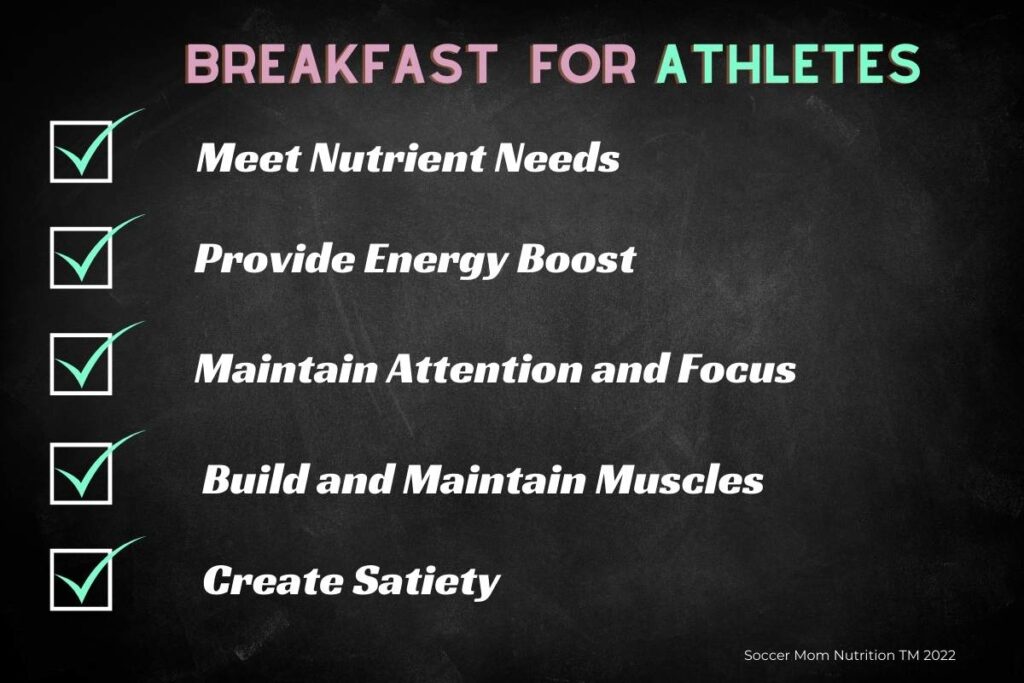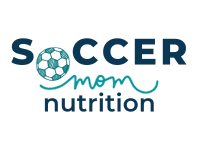Breakfast for Athletes [5 Reasons You Can’t Skip It]
The importance of breakfast for athletes cannot be underestimated.
If you’re an athlete, you know how important it is to train hard, recover well and stay healthy. But did you know that what you eat for breakfast can make a big difference in your performance and well-being?
Breakfast is the most important meal of the day for athletes, and skipping it can have negative consequences on your energy, focus, muscle and appetite. (1)
In this post, we’ll explain why breakfast is so important for athletes, what nutrients you need and what foods you should eat to fuel your performance.

What’s the importance of breakfast for athletes
The importance of breakfast for athletes is that athletes need to maintain and replenish energy stores and nutrients consistently for optimal performance.
By eating a good meal at the start of the day, you’ll make sure to get the energy you need to fuel your performance.
Therefore, you need to develop a routine of eating well balanced meals and snacks throughout the day.
In fact, skipping breakfast reduces your endurance for an evening practice. This happens even if you eat a hearty lunch or squeeze in a snack. (2)
Since your energy stores don’t get fully replenished, you’re more likely to be slower and tired.
And it’s harder to make up for that missed fuel. In fact, eating breakfast improves insulin sensitivity which helps your muscles store energy for activities throughout the day (and practice or games!) (3)
This can continue supporting any recovery from intense bouts of exercise the day before.
Why should athletes eat breakfast
There are 5 key reasons that highlight the importance of breakfast for athletes:
- Helping you meet your nutrient needs. Athletes need more nutrients than the average person to support their energy use, muscle growth and overall health. Eating breakfast regularly can help you get enough fiber, calcium, vitamins A and C, riboflavin, zinc and iron. (4)
- Providing an energy boost to improve performance. After a long night of sleep and fasting, your muscle energy stores are low. Eating breakfast can replenish them and give you the energy you need to power through your morning routine and your sports activities.
- Maintaining attention and focus. You can nourish your brain by eating breakfast and it helps you stay alert and focused. Studies have shown that eating breakfast can improve attention, problem-solving and memory in kids. (5, 6)These skills are essential for athletes who need to perform well on the field and in the classroom.
- Building and maintaining muscles. Eating breakfast can also help you preserve and enhance your muscle mass. (7) Research has shown that eating breakfast can prevent muscle protein breakdown and increase muscle strength. (8) This is especially important for athletes who want to improve their power and endurance.
- Creating satiety. Eating breakfast can also help you feel full and satisfied throughout the day. This can help you avoid underfueling, overeating or bingeing on unhealthy foods later on. (9) It can also help you eat more balanced meals and snacks that match your energy needs.

How to overcome common breakfast challenges
Some athletes might face some challenges when it comes to eating breakfast.
Here are some common ones and how to overcome them:
Not having enough time
If you have a busy morning schedule or need to rush out the door early, prepare your breakfast ahead of time or choose something quick and easy to make.
You could make overnight oats by soaking oats, milk and fruit in a jar overnight, or grab a granola bar and a piece of fruit on your way out.
Not feeling hungry
If you don’t have an appetite in the morning or feel nauseous after eating, start with something light and easy to digest.
Try drinking a smoothie made with yogurt, fruit and spinach, or eat some crackers and cheese.
Not liking breakfast foods
If you don’t enjoy traditional breakfast foods or get bored of eating the same thing every day, be creative and try something different .
Eat leftovers from last night’s dinner, or make a sandwich with whole wheat bread, ham and cheese.

The best foods to eat for breakfast as an athlete
Now that you know why breakfast is important for athletes, you might be wondering what to eat for breakfast.
Here are some tips to help you choose the best foods for your morning meal:
- Aim for a balanced plate that includes carbohydrates, protein, healthy fats and fruits or vegetables. Carbohydrates are your main source of energy, protein helps build and repair your muscles, healthy fats support your brain and heart health, and fruits or vegetables provide vitamins, minerals, antioxidants, and fiber.
- Choose high-quality carbohydrates that are rich in fiber and low in added sugars. Examples include whole grains such as oatmeal, whole wheat bread or quinoa, fruits such as bananas, berries or apples, or starchy vegetables such as sweet potatoes.
- Choose lean protein sources that are low in saturated fat and high in amino acids. Examples include eggs, low-fat dairy products (such as high protein milk, milk, yogurt, or cheese), lean meats (such as chicken, turkey, or fish), or plant-based proteins (such as beans, nuts, seeds, or tofu).
- Choose healthy fats that are rich in omega-3 fatty acids and monounsaturated fats. Examples include nuts such as almonds, walnuts or pistachios, seeds such as chia seeds, flax seeds or sunflower seeds, avocados, olive oil or nut butters such as peanut butter or almond butter.
- Choose fruits or vegetables that are colorful and varied. Examples include berries such as strawberries, blueberries or raspberries, citrus fruits such as oranges, grapefruits or lemons, leafy greens such as spinach, kale or lettuce, or cruciferous vegetables such as broccoli, cauliflower or cabbage.
What nutrients do athletes need for breakfast
As an athlete, you need a balanced breakfast that meets about 25-35% of your daily calorie needs with a mix of high-quality carbohydrates, moderate protein, and low fat.
- Carbohydrates are your main source of energy and the most important nutrient for performance. They provide fuel for your muscles and brain and help prevent fatigue and injury.
- Protein is the building block for your muscles, ligaments, and tendons. It helps repair and grow your tissues after exercise and supports your immune system and hormone production.
- Fat is another source of energy that supports prolonged activity. It also helps with the absorption of some vitamins and minerals and protects your organs and cells.
In addition to these macronutrients, you also need micronutrients such as vitamins, minerals, antioxidants and fiber.
These nutrients help with various functions in your body such as metabolism, hydration, oxygen transport, inflammation control, bone health and digestion.
What foods should athletes eat for breakfast
There are many foods that can provide you with the nutrients you need for breakfast as an athlete. The key is to choose foods that are rich in fiber, lean protein, healthy fats, and antioxidants.
Good breakfast foods for athletes
- Whole grains: oatmeal, whole wheat bread or quinoa
- Fruits: bananas, berries or apples
- Starchy vegetables sweet potatoes, potatoes or corn
- Eggs
- Low-fat dairy products: high protein milk, milk, yogurt or cheese
- Lean meats chicken, turkey or fish
- Plant-based proteins beans, nuts, seeds, tempeh or tofu
- Nuts: almonds, walnuts or pistachios
- Seeds: chia seeds, flax seeds or sunflower seeds
- Avocados
- Olive oil or nut butters: peanut butter or almond butter
Combination breakfast food ideas
- Overnight oats with milk, fruit and nuts
- Waffles with fruit, low fat Greek yogurt and seeds
- Pita bread with hummus, falafel and veggies
- Omelet with cheese, veggies and lean or plant-based sausage
- Smoothie with yogurt, fruit spinach and nut butter
- Leftover lasagna with a side of broccoli
- Breakfast burrito with eggs, black beans and fresh tomato salsa
- Leftovers-thick crust pizza, Chinese food, burrito
- Turkey sandwich with side of fruit
- Breakfast BLT with avocado, fried egg, bacon
- Baked oatmeal with nuts, dried fruits and topped with greek yogurt
- Burrito bowl with lean or plant based breakfast sausage, salsa, avocado
Final thoughts
Breakfast is the most important meal for athletes, and eating it can help you improve your performance, health and well-being.
To make the most of your breakfast, aim for a balanced plate that includes carbohydrates, protein, healthy fats and fruits or vegetables.
Choose high-quality foods that are rich in fiber, lean protein, healthy fats and antioxidants.
And overcome any challenges that might prevent you from eating breakfast by preparing ahead, starting light or being creative.
We hope this post has helped you understand the importance of breakfast for athletes and what to eat to fuel your performance.
If you have any questions or comments, feel free to leave them below.
And don’t forget to subscribe to our blog for more nutrition tips and advice for athletes.
Join our mailing list and get our FREE Pre-Activity Fueling Guide.
Stephanie Magill, MS, RD, CD, FAND has over 22 years of experience in public health and nutrition. As a performance registered dietitian nutritionist, Stephanie specializes in sports nutrition and provides simple and actionable information so that athletes can be well fueled for high performance on and off the field. Stephanie has a Master’s Degree in Nutrition and is a Fellow of the Academy of Nutrition and Dietetics.


Thank you!